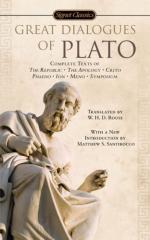|
This section contains 702 words (approx. 2 pages at 400 words per page) |

|
Republic: Book VII Summary
Socrates provides a metaphor to describe the process of obtaining knowledge of the absolute good. The common man is like one who is imprisoned in a cave and only sees the shadows cast by people and objects moving outside; since this is all that he has seen, he takes these shadows to be the realities himself: He takes the objects he sees everyday to be the ultimate reality. The philosopher, however, is like a man who has been released from his imprisonment and is able to leave the cave and see the objects as they really are, just as he does not focus on the objects of perception but, through philosophy, aspires to know the absolute truths in themselves. In either case, there is a kind of adjustment: one who is accustomed to focus only on sensible objects will...
(read more from the Republic: Book VII Summary)
|
This section contains 702 words (approx. 2 pages at 400 words per page) |

|




